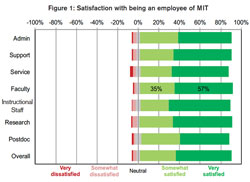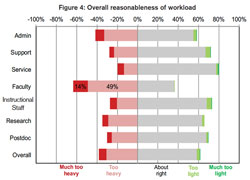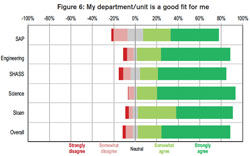
| Vol.
XXV No.
1 September / October 2012 |
| contents |
| Printable Version |
Survey Says: Faculty Happy But Stressed
Highlights from the 2012 Faculty and Staff
Quality of Life Survey
Faculty and staff appear to be quite satisfied in their role at MIT. More than 90% of survey respondents said they were somewhat or very satisfied being an MIT employee (see Figure 1). Across all Schools, faculty posted higher satisfaction ratings in 2012 than in 2008 (see "M.I.T. Numbers").
Early this year, then-Provost Rafael Reif and Executive Vice President and Treasurer Israel Ruiz invited MIT faculty and staff to participate in a quality of life survey. The Web-based survey was sponsored by the Council on Family and Work, Office of the Provost, and Chair of the Faculty. The purpose of the survey was to examine the work-life environment for faculty, other instructional staff, researchers, postdoctoral scholars, administrative staff, support staff, and service staff at MIT.
The survey closed in late February with more than 7,000 responses, achieving a 61% overall response rate. Two-thirds of faculty answered the survey, in line with the 69% of faculty who answered a similar survey in 2008.
Below is a summary of some of the broad-level campus results, organized by topic area.
Satisfaction
When asked about their satisfaction with life outside of MIT, most employee groups rated this item slightly higher than satisfaction with being an employee, except for faculty and postdoctoral scholars, who tended to report lower satisfaction with their life outside MIT. Faculty and postdoctoral scholars also tended to report lower levels of satisfaction with their ability to integrate the needs of their work with their personal/family life – 64% and 70%, respectively (see Figure 2). While faculty, on average, were less satisfied with work-life integration than other groups, they saw a marked improvement in 2012 over 2008, when just 41% of faculty reported being somewhat or very satisfied.
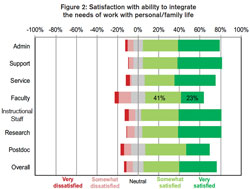
(click on image to enlarge)
Workload and Stress
On average, faculty and postdoctoral scholars reported working more hours per week than other employee types (see Figure 3). Faculty also tended to rate their workload heavier than other groups on campus; more than half of faculty said their workload was too heavy or much too heavy, while fewer than 1% said too light or much too light (see Figure 4). Faculty in 2012 reported heavier workloads than faculty in 2008 (64% too heavy or much too heavy in 2012, compared to 58% in 2008).
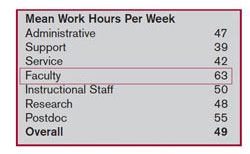
In tandem with the findings regarding workload, faculty were more likely than other groups to report being overwhelmed by all they had to do during the past year (see Figure 5).
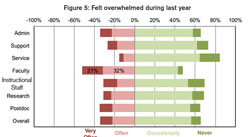
Climate
The survey had a number of questions about department/unit climate. Among them was one that asked faculty and staff to rate their level of agreement or disagreement with: “My department/unit is a good fit for me.” 83-87% (depending on employee type) said they somewhat or strongly agreed with this statement. 86% of faculty agreed with the statement, up from 77% in 2008. See Figure 6 for a breakdown of faculty results by School.
The vast majority of respondents also expressed confidence in their work abilities; 90% or more of faculty and staff, regardless of type, somewhat or strongly agreed with “I am confident in my ability to do my job well.”
Mentoring
The survey asked several questions on mentoring, including one about whether or not faculty and staff felt as though they had received adequate mentoring while they were at MIT. More than half of service and support staff chose “Not applicable” for this question – compared to just 13% of faculty. Faculty were more likely than other groups to say they had received adequate mentoring (see Figure 7).
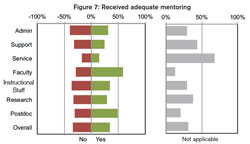
(click on image to enlarge)
The data from the comprehensive survey will be the basis for the next phase of work for the Council on Work and Family, which is to write a formal report and formulate recommendations that can improve the well-being of our community, helping to ensure MIT is a place where we have fulfilling and productive professional and personal lives.
Faculty Chair Sam Allen comments on the survey results.
Text and data for this article were provided by the Office of the Provost/Institutional Research.
| Back to top | |
| Send your comments |
| home this issue archives editorial board contact us faculty website |
